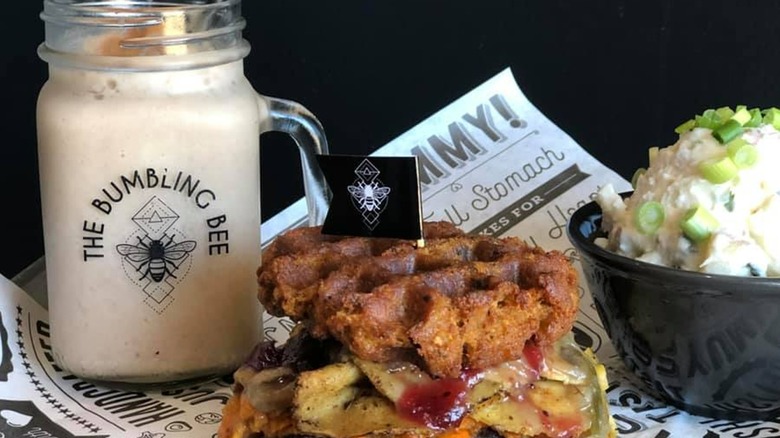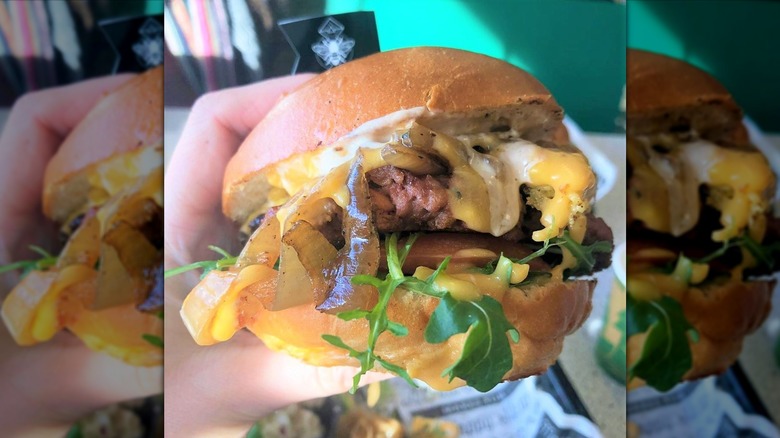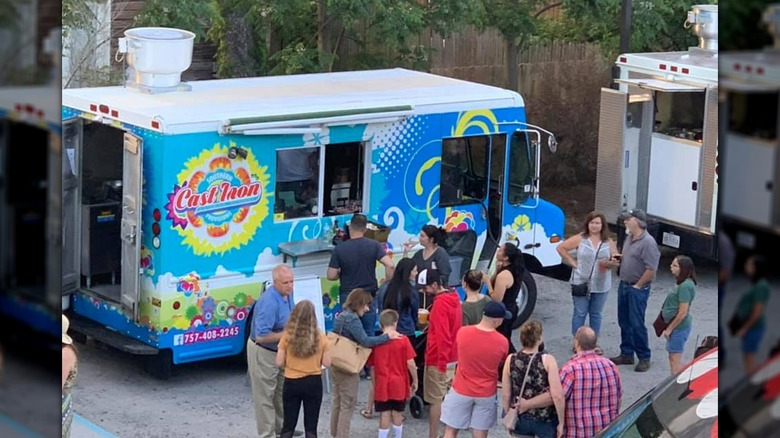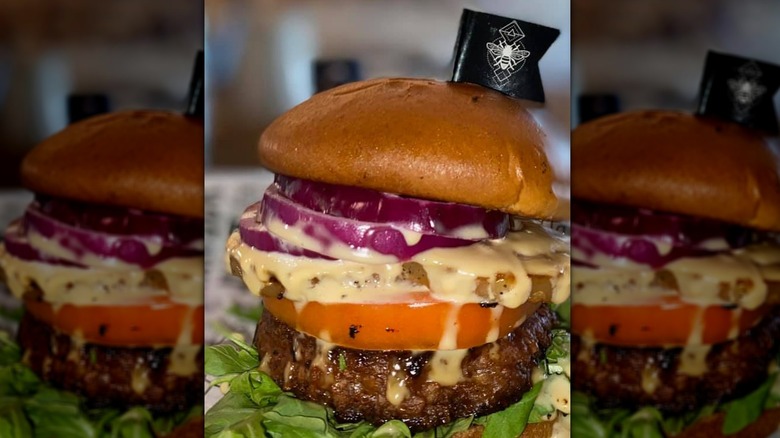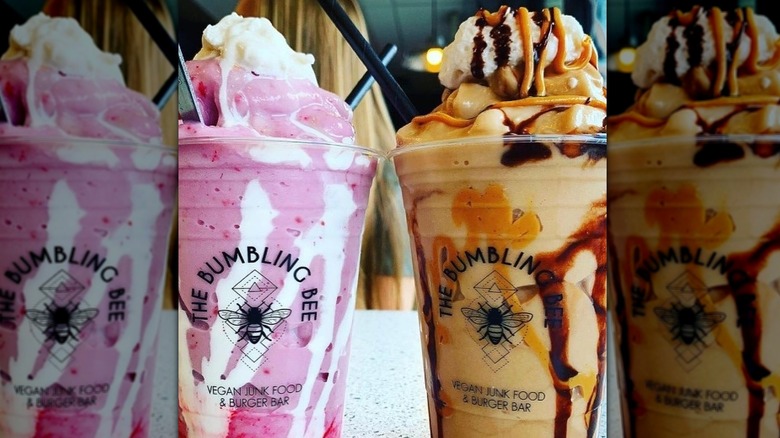What Happened To The Bumbling Bee After Shark Tank?
Without a doubt, veganism's popularity has exploded over the last several years, to the point where it's difficult to compile only a short list of the best vegan restaurants in the U.S. Regardless, one small business — Bumbling Bee — found an opportunity to get itself on that list, pitching itself to the "Shark Tank" investors.
Mom and daughter duo Cassandra and India Ayala brought their vegan burger bar to the tank in season 12, episode 22, in 2021. They were hoping that an investment could help them expand their brand across the country and show people that the vegan diet can be so much more than rabbit food. The pair explained that most vegan restaurants concentrated on what is generally considered healthy foods and that instead they were filling the need for vegan junk food. Their company offers traditional comfort foods, like cheeseburgers with plant-based meats and cheeses, loaded fries, and dairy-free milkshakes.
The pair asked for $150k in exchange for 10% equity, and as the samples were passed around the Sharks were obviously impressed. Cassandra and India's odds couldn't have looked better. So, where is Bumbling Bee today?
Bumbling Bee created quite the buzz with the Sharks
In the tank, entrepreneur Cassandra Ayala explained to the Sharks how she had grown up in homeless shelters, digging through dumpsters to find food. She was determined to never go hungry again. She started in the fast food industry with a hot dog cart after the market crash in 2008 wiped out her real estate business, refusing to let life knock her down for the count. Several years down the road, she was able to invest in food trucks, and finally a brick-and-mortar restaurant near Virginia Beach in 2019, and a restaurant in Boulder, Colorado in 2020. By switching the Bumbling Bee's menu over to plant-based foods, she was able to get her three daughters involved in the business as well.
The Sharks questioned whether or not Bumbling Bee had the sales to support expansion. Cassandra assured them that they expected to make more than $324k in 2021, despite COVID-related closures. Mark Cuban was concerned that other businesses would copy Bumbling Bee, and given its small size, he worried that it could easily be wiped out by any competition.
Ultimately, the Sharks didn't see enough differentiation between Bumbling Bee and any other vegan restaurant to make them want to take the risk of investing. Instead, they recommended that the Ayalas work with what they have, continuing to build the business themselves until it was ready to expand organically. Cassandra and her daughter India left the tank without a deal.
Customers flocked to Bumbling Bee after its Shark Tank appearance
As is the case with many memorable "Shark Tank" food companies, Bumbling Bee experienced the show's effect on sales shortly after its episode aired. The business shared on Instagram that it was "overcome with joy at all the love and support everyone has shown," with its trucks and restaurants actually struggling to keep up with the demand for veganized junk food.
By June 2021, just months later, Cassandra broke the news that Bumbling Bee was closing its brick-and-mortar locations due to staffing shortages and building issues. However, the business continued to serve its vegan junk food with its two food trucks, Daisy and Dixie, managing to break $1 million in sales. In an interview with WTKR News 3, Cassandra Ayala explained how Bumbling Bee went on a food truck tour of its own creation across Virginia, banding together with other food truck businesses and events to drive sales. Bumbling Bee even eventually joined the VegFest tour in New Jersey, Tennessee, and Georgia.
Clearly, Bumbling Bee has found no shortage of hungry customers wanting to try its juicy veggie burgers and vegan cheese fries — as opposed to the usual vegan fare — so is this business still buzzing around today, or has it gone buzz-t?
Bumbling Bee is still around in 2023
Despite having its growth affected by the COVID-19 pandemic, Bumbling Bee is still in business as of October 2023. Granted, the business operates solely out of food trucks, having put brick-and-mortars on the backburner for the time being, but it seems to be doing well for itself regardless.
Bumbling Bee continues to make about $1 million in sales each year, placing the business among the top 10% of food trucks in terms of annual revenue. That's pretty darn good for a company that didn't land a deal on "Shark Tank," and makes a whole lot of sense considering the niche market for vegan junk food.
Today, Bumbling Bee's trucks offer various burgers, such as the boss bbq bakun, chili cheese dogs and fries, a fried chicken sandwich called the mother clucker, loaded fries, and various shakes, with prices ranging from $7 for an order of nuggets to $16 for a burger. Just looking at the food, you'd never guess it's made without animal products. The business also maintains nearly 14k followers between Facebook and Instagram, so no one can say that Bumbling Bee isn't holding its own. That being said, what does the future have in store for this beloved burger-bar-on-wheels?
The future of Bumbling Bee is uncertain, but holds potential
As the Sharks pointed out during Bumbling Bee's "Shark Tank" pitch, the business could very well be just another vegan food truck in a long line of the same. More than 36k food trucks operate in the U.S., which means Bumbling Bee has plenty of competitors, including vegan versions, such as the Slutty Vegan, Dirty Lettuce, and Stairway to Veggin'. Regardless, Cassandra Ayala has maintained that she is committed to serving up the best burger you can get, and we've already seen just how far her determination can take her.
Unfortunately, Bumbling Bee seems to be struggling to keep up with demand. After briefly partnering with the College of William & Mary in the early fall of 2023 to sell food on-campus, the business announced on Instagram that it was "taking a step back," admitting that this particular location was "not financially sustainable" at this point in time. The food trucks are still going strong, though with plans to continue visiting festivals, and they announce their upcoming travels on Instagram and Facebook.
